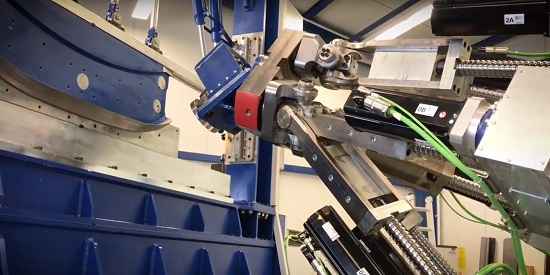Deakin launches $1.5m facility for next-gen metal fabrication
Media release
A first-of-its-kind $1.5 million facility dedicated to advanced metal development and 3D roll forming has been launched at Deakin's Institute for Frontier Materials (IFM), supported by the Federal Government through the Australian Research Council (ARC).
The IFM Flexible Forming Facility will have the capacity for complex roll forming – a process involving incrementally bending metal strips into highly specified shapes.
ARC Chief Executive Officer Professor Sue Thomas today joined Deakin University Deputy Vice‐Chancellor Research Professor Joe Graffam to launch the Facility at Deakin's Geelong Waurn Ponds Campus.
Roll forming of structural and crash components is now widely applied across the automotive industry, thanks to the creation of high-performance materials such as Ultra High Strength Steels, advanced aluminium alloys and metal laminates.
Using a specially-developed roll former, the new Deakin facility is capable of developing super-strong final products with applications across the automotive, rail and aerospace industries.
Professor Graffam said the facility would be used for proof-of-concept studies on the flexible roll forming process, rapid prototyping and the manufacture of complex profiles from hard-to-form materials.
"The world-first IFM Flexible Forming Facility presents an exciting new opportunity for industry collaboration and research at Deakin University," Professor Graffam said.
"Higher strength steels are increasingly being used in the automotive industry for the manufacture of lightweight structural and crash components and roll forming is more and more becoming the manufacturing process of choice for these hard-to-form material solutions.
"Deakin is committed to the advancement of ideas that make a difference to the communities we serve through research and innovation. This new facility will extend our critical mass of dedicated and high-calibre researchers breaking boundaries in next generation manufacturing, strengthening our leadership in the international area in this important field."
The IFM Flexible Forming Facility features a dynamic 3D roll forming process developed, patented and manufactured by German research partner data M Sheet Metal Solutions.
Roll stands are no longer fixed in place during the process, allowing for more parts flexibility, faster fabrication, and greater potential cost savings compared to conventional forming methods such as metal stamping.
The facility was supported by a $280,000 ARC Linkage Infrastructure, Equipment and Facilities (LIEF) scheme funding grant.
Professor Thomas said: "I am pleased that Australian Research Council funding is supporting a rich ecosystem of manufacturing research expertise, a significant component of which is industry-led, at Deakin University.
"Quality research infrastructure is a critical component of Australia's research and development system. With this in mind, the ARC's LIEF scheme is designed to enable researchers to participate in cooperative initiatives so that expensive infrastructure, equipment and facilities can be shared between higher education organisations and industry.
"This funding has enabled Deakin University to leverage extensive support from an impressive array of collaborating industry partners to establish a research facility that promises to deliver major advances for Australian manufacturing of complex components for automotive, aerospace, truck and rail industries."
The IFM Flexible Forming Facility launch was chaired by Deakin Pro Vice‐Chancellor Future Fibres Professor Xungai Wang and featured a presentation from IFM Senior Research Fellow Dr Matthias Weiss, who has been involved in sheet metal forming research at Deakin University for the past 15 years and is currently Head of the University's Roll Forming Research Group.
The launch was followed by a tour of IFM, Deakin's Carbon Nexus carbon fibre research facility and $13 million ManuFutures advanced manufacturing innovation hub.

